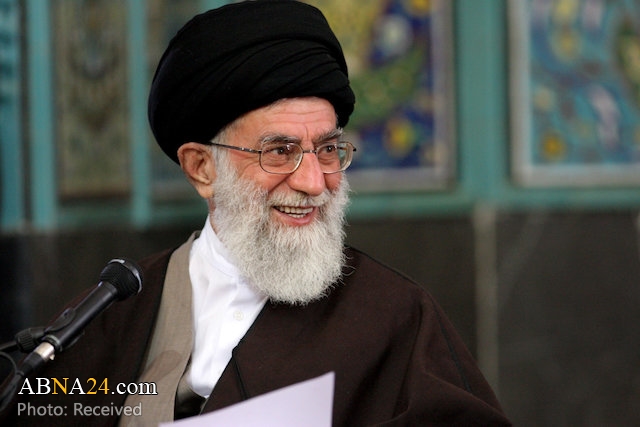AhlulBayt News Agency (ABNA): I would also like to congratulate the entire Iranian nation and all Muslims throughout the world on Eid al-Adha.
The next occasion is the Day of Arafat and Eid al-Adha. In fact, the period from Eid al-Adha to Eid al-Ghadir is associated with the issue of imamate [leadership]. Allah the Exalted says in the Holy Quran, "And when his Lord tried Ibrahim with certain commands he fulfilled them. He said: Surely I will make you a leader of men." [The Holy Quran, 2: 124] Ibrahim was selected by God to be an Imam [leader]. Why? Because he underwent difficult tests. We can think of the period between Eid al-Adha and Eid al-Ghadir - when Ali ibn Abi Talib (a.s.) became an Imam - as the beginning of this. Imam Ali was also appointed as leader after he went through difficult tests. The Commander of the Faithful underwent different tests throughout his life and managed to emerge victorious out of all these tests. From the age of 11 or 13 when he accepted prophethood to the time when the Holy Prophet (s.w.a.) immigrated to Medina, Imam Ali (a.s.) was a selfless young man who was prepared to lay down his life for the sake of the Holy Prophet - and he proved this on the night the Holy Prophet left Mecca for Medina. Afterwards, he went through those difficult tests in such battles as Badr, Uhud, and Khaibar. His high position was the result of those tests. Therefore, people feel in their hearts that there is a connection between Eid al-Adha and Eid al-Ghadir. Some people have appropriately named the period between these two occasions as "the imamate period".
If we pay attention to the philosophy inherent in Eid al-Adha, many paths will be opened up for us. A select Messenger of the Righteous One, Prophet Ibrahim (a.s.), made a sacrifice on Eid al-Adha. In some cases, sacrificing your loved ones is beyond sacrificing your life. Prophet Ibrahim was about to sacrifice a loved one in the way of God - a young child whom Allah the Exalted had bestowed on him at an old age after a lifetime of waiting. "Praise be to Allah, Who has given me in old age Ismail and Ishaq. Most surely my Lord is the Hearer of prayer." [The Holy Quran, 14: 39] Allah the Exalted had bestowed these two sons on him at an old age, probably after a lifetime of impatient waiting. He had no hope of getting another child at that age. The Master of the Martyrs of the entire world, Imam Hussein (a.s.), who is the symbol of sacrifice and martyrdom, remembers this event in the holy prayer of Arafah: "And Ibrahim decided to sacrifice his son at an old age after waiting a lifetime." This is part of a dua by Imam Hussein (a.s.) in Arafah, a dua that was recited by hajjis yesterday.
This sacrifice is a symbol for the faithful people who want to tread the path of truth, transcendence and perfection. This is impossible without a sacrifice. In fact, all the tests that we go through involve one essential element - all tests involve a sacrifice. Sometimes this involves sacrificing your life and wealth. Other times it involves forgiving somebody for a comment he makes and insists on stubbornly. Yet other times it involves sacrificing your dear ones - your children and your loved ones. Being tested means going through hardships. When a hardship is placed in the way of an individual or a people, going through this hardship is a test. If they go through this hardship, they will reach the desired destination. And if they fail - if they fail to utilize the talent within them, if they fail to overcome their passions - they will fall by the wayside. This is what a test is. God does not put us through divine tests in order to get to know us and see at what level we are. Divine tests are in fact a step towards one's destination. When we are tested and we manage to go through the hardships of tests, we enter a new situation, a new stage of life. A nation and an individual are not different from one another in this regard.
Nov 17, 2010
#khamenei #shia #shiite #velayat #leadership #islam #imam_ali #eid_ghadir #eid_aladha
/129

